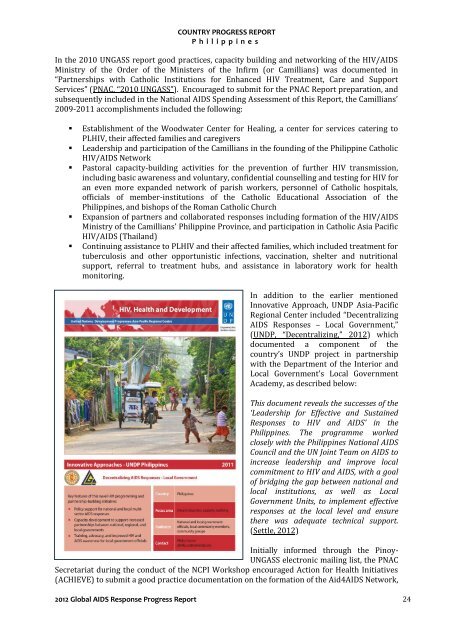Download this publication - HIV/AIDS Data Hub
Download this publication - HIV/AIDS Data Hub
Download this publication - HIV/AIDS Data Hub
You also want an ePaper? Increase the reach of your titles
YUMPU automatically turns print PDFs into web optimized ePapers that Google loves.
COUNTRY PROGRESS REPORTP h i l i p p i n e sIn the 2010 UNGASS report good practices, capacity building and networking of the <strong>HIV</strong>/<strong>AIDS</strong>Ministry of the Order of the Ministers of the Infirm (or Camillians) was documented in“Partnerships with Catholic Institutions for Enhanced <strong>HIV</strong> Treatment, Care and SupportServices” (PNAC, “2010 UNGASS”). Encouraged to submit for the PNAC Report preparation, andsubsequently included in the National <strong>AIDS</strong> Spending Assessment of <strong>this</strong> Report, the Camillians’2009-2011 accomplishments included the following:• Establishment of the Woodwater Center for Healing, a center for services catering toPL<strong>HIV</strong>, their affected families and caregivers• Leadership and participation of the Camillians in the founding of the Philippine Catholic<strong>HIV</strong>/<strong>AIDS</strong> Network• Pastoral capacity-building activities for the prevention of further <strong>HIV</strong> transmission,including basic awareness and voluntary, confidential counselling and testing for <strong>HIV</strong> foran even more expanded network of parish workers, personnel of Catholic hospitals,officials of member-institutions of the Catholic Educational Association of thePhilippines, and bishops of the Roman Catholic Church• Expansion of partners and collaborated responses including formation of the <strong>HIV</strong>/<strong>AIDS</strong>Ministry of the Camillians’ Philippine Province, and participation in Catholic Asia Pacific<strong>HIV</strong>/<strong>AIDS</strong> (Thailand)• Continuing assistance to PL<strong>HIV</strong> and their affected families, which included treatment fortuberculosis and other opportunistic infections, vaccination, shelter and nutritionalsupport, referral to treatment hubs, and assistance in laboratory work for healthmonitoring.In addition to the earlier mentionedInnovative Approach, UNDP Asia-PacificRegional Center included “Decentralizing<strong>AIDS</strong> Responses – Local Government,”(UNDP, “Decentralizing,” 2012) whichdocumented a component of thecountry’s UNDP project in partnershipwith the Department of the Interior andLocal Government’s Local GovernmentAcademy, as described below:This document reveals the successes of the‘Leadership for Effective and SustainedResponses to <strong>HIV</strong> and <strong>AIDS</strong>’ in thePhilippines. The programme workedclosely with the Philippines National <strong>AIDS</strong>Council and the UN Joint Team on <strong>AIDS</strong> toincrease leadership and improve localcommitment to <strong>HIV</strong> and <strong>AIDS</strong>, with a goalof bridging the gap between national andlocal institutions, as well as LocalGovernment Units, to implement effectiveresponses at the local level and ensurethere was adequate technical support.(Settle, 2012)Initially informed through the Pinoy-UNGASS electronic mailing list, the PNACSecretariat during the conduct of the NCPI Workshop encouraged Action for Health Initiatives(ACHIEVE) to submit a good practice documentation on the formation of the Aid4<strong>AIDS</strong> Network,2012 Global <strong>AIDS</strong> Response Progress Report 24















